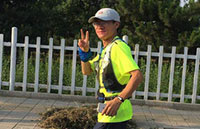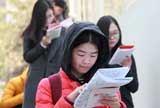Overseas Chinese graduates return with knowledge, knowhow
(Xinhua) Updated: 2016-06-21 15:20BEIJING -- Chen Ning was pleasantly surprised when it took just four hours for his business license to be approved by Shenzhen city government in south China. In the past, the process could last months.
"I was astonished," said Chen, who graduated from Georgia Institute of Technology, the United States, with a PhD in engineering, decided to return to China two years ago to start a human intelligence device company.
A year later, his firm released a human face recognition system, which cut the time it took to identify a person from a facial database from several weeks to a few seconds.
Recently, the police used the system to identify a suspect from a video clip, it took just five seconds. The system will be used at this year's G20 summit in Hangzhou, China.
Chen is one of millions of Chinese overseas graduates who aspire to bring their knowledge and intelligence back home.
The central government has been promoting entrepreneurship and innovation as a key driver of the nation's economic transition.
This drive is called "shuangchuang," a national plan to boost innovative activities as a way to ride out the major economic transition and maintain sustained growth.
The government has made market entry easier, cut red tape and rolled out tax breaks for startups. Overseas returnees, as well as college students and migrant workers, are emerging as major forces in entrepreneurship.
Data released by the Ministry of Human Resources and Social Security showed the number of overseas returnees in 2015 was 12.1 percent from that recorded in 2014.
LinkedIn observed in its latest survey that in the past five years, more and more overseas Chinese graduates had returned to China, with more than half from the United States and Britain.
- Thousands flee their homes amid fatal downpours
- Chinese supercomputer tops list of world's fastest
- Booze banned at official banquets
- Students paying $15,000 to consultants to select college
- US urged not to meddle with internal Tibet affairs
- China puts squeeze on imported TV shows and remakes
- Apple's appeal in iPhone case accepted by IP court
- China on yellow alert for rainstorms
- Disney visitors soak up a new experience
- China vows better care for children in difficulty










